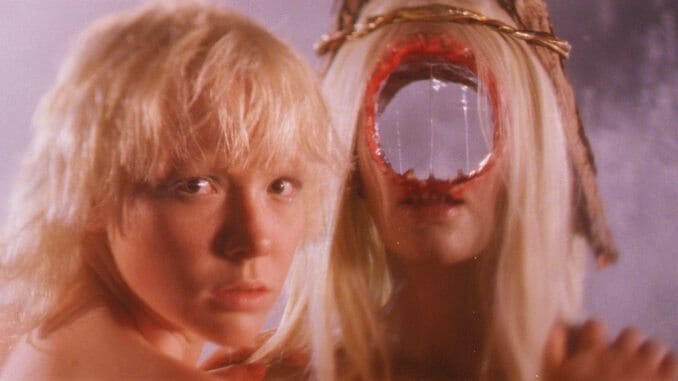Acid Western After Blue Is a Bad Trip

The Incoherence Manifesto—a sort of Dogme 95 attempt penned by filmmakers Bertrand Mandico and Katrin Olafsdottir—pledges cinematic incongruity in the following: Screenplay, manufacturing, effects, style, sophistication, time and geography, taste, cinematography and acting. Within this film logic, screenwriting traditions are forsaken; filming must be done on expired stock; all effects are practical; actors will alternate between non-acting and overacting; the product should be synthetic, unbound by the particulars of any one genre.
“To be incoherent means to have faith in cinema, it means to have a romantic approach, unformatted, free, disturbed and dreamlike, cinegenic, an epic narration,” said Mandico. It’s a convenient thing, an incoherence principle; a standard of practice primed for especial worldbuilding, and as a buffer for critical assessment. If incoherence is baked into the film’s credo, can it ever really fail? Should the whole thing sputter into incognizance, it still succeeds on its own terms. But where something like Dadaism conceptualized its criterion as a rebuff against capitalist esthetics, the Incoherence Manifesto’s abstractions feel aimlessly contrarian.
Mandico’s acid Western After Blue (Dirty Paradise) tests this theory, often to its own detriment. Set on After Blue, a post-Earth planet of “ovarian bearers”—males die in infancy by choking on their own hair, truly—After Blue follows Roxy (Paula Luna), a horny, ditzy teenager who unknowingly unearths a malevolent woman during a beach trip and then has to hunt her down with the help of her intercosmic hairdresser mother.
Roxy (nicknamed Toxic by her awful friends, a strange half-jab at so-called toxic femininity) happens upon what looks like a rotting, decapitated head tucked into the sand. In actuality, there’s a neck, and a body too, hiding beneath the surface. Jolting awake, the formless woman promises to grant Roxy “three hidden desires” should she dig her out. Horny and ditzy as ever, Roxy agrees, trawling through the sand in search of the concealed body in an orgasmic display of low moans and thick, wet glitter.
-

-

-

-

-

-

-

-

-

-

-

-

-

-

-

-

-

-

-

-

-

-

-

-

-

-

-

-

-

-

-

-

-

-

-

-

-

-

-

-








































